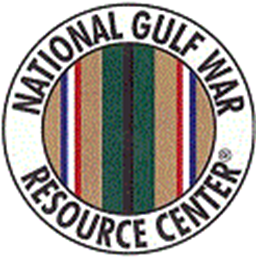Since 1995, the National Gulf War Resource Center, Inc. (NGWRC) provides education, advocacy and support for the veterans suffering from the complexities from today’s toxic battlefields.
Veterans and non-veterans run the NGWRC to help fulfil our mission. We help veterans affected by the ‘invisible’ injuries most common in the conflict period, from 1990 to the present day. These injuries include Gulf War Illness (GWI), Burn Pits, Traumatic Brain Injury (TBI), and Post-Traumatic Stress Disorder (PTSD) and several secondary issues that can follow.
The term ‘Gulf War-era Veteran’ refers to any veteran who served from Aug. 2, 1990 to present day. The Gulf War period is still in effect. This means that anyone who served on active duty from August 2, 1990, to present is considered a Gulf War Veteran. For example, the Veterans Pension benefit requires service during a wartime period. Therefore, any Veteran who served on active military service for any period from August 2, 1990, to the present meets the wartime service requirement.
The term ‘Gulf War Veteran’ refers to any a veteran who was deployed to Southwest Asia during one of the many different operations such as but not limited to: Desert Shield, Desert Storm, Iraqi Freedom, New Dawn, Enduring Freedom, Inherent Resolve or any other operations with dates from August 1990 until the present day. We work with veterans who have served and deployed since August 1990 until today, no matter the Area of Operation.
In the Beginning we were among the first Veterans’ Organizations in the United States solely advocating for veterans affected by our service in the Gulf War where many veterans were exposed to more than 25 different toxins.
Our work has been critical in establishing changes to laws, and regulation, new research, treatments, and benefits which these veterans have access to now. Our work is far from done as the effects for the exposure to the toxins on the battlefield that cause the illnesses like “Gulf War Illness” is still poorly understood and incurable and hard to provide benefits for. Claims for benefits from the Department of Veterans Affairs related to “Gulf War Illness” are still difficult to get granted and too many are still denied in error.
It is our mission to help all veterans who served in the US armed forces from 1989 to the present day. Later conflicts, including Operation Enduring Freedom and Operation Iraqi Freedom, have brought many new claims for other ‘invisible’ injuries, TBI and PTSD, as well as a reduced frequency of new Gulf War Illness cases among recent veterans deployed in and near Iraq due to the toxic wars. We expanded the original guide to include these conditions.
Principal Purpose
The principal purpose of the National Gulf War Resource Center:
To provide education and support to benefit veterans and their families.
To promote research and provide referrals that will improve the lives of these veterans and work to enable them to obtain the care and benefits they have earned.
To directly educate our veterans, provide a forum for them to discuss issues and help them to help one another.
To continue to collect and disseminate resources to individuals and organizations interested in providing services to those affected by the Persian Gulf War and Today’s Toxic Wars.
Core Values
1. Advocate tirelessly for veterans with Gulf War issues – We will promote media awareness and Congressional investigations to ensure that Department of Veterans Affairs (VA) Gulf War review efforts are comprehensive, correct and supportive of the South West Asia (SWA) veteran.
2. Provide educational material and assistance to Veterans and their families – We are committed to helping veterans improve their chances of receiving overdue compensation for their service-connected illnesses. A key component of that commitment is producing and updating a Self Help Guide that covers important topics such as medical research that support veterans of today’s toxic wars and assistance available from federal agencies such as the Department of Veterans Affairs.
3. Educate VA, legislators and medical facilities on the complexities of Gulf War Illnesses and the byproduct of the many different toxic exposure in the war- We serve the veteran by informing legislators of provisions needed to protect, treat and compensate todays Veterans, and we educate medical providers on the wide variety of symptoms and illnesses faced by these veterans.
4. Create a diverse, dynamic organization dedicated to vital veteran issues – Gulf War Illness and Toxic exposure issues affect veteran, scientific community, legal community, family and other constituents, as well as current and future service members. To ensure adequate involvement and to prevent repetition of past mistakes, NGWRC solicits from all interested communities and constantly updates its website with relevant and useful information.
5. Review and analyze all relevant government and industry actions, policies, research efforts, and writings concerning Gulf War Era and future veterans’ issues – We are committed to being a leader in understanding the complexities of Gulf War Illnesses by evaluating new concepts in treatment through collaborations with and our organizational presence at the Department of Veterans Affairs Research Advisory Committee meetings. We will continue to create and implement progressive policies that maximize results for the veterans, increase public understanding, help create clear understanding of illness issues, and ensure the protection of future veterans.
6. Further comradeship amongst those who are or have been members of the Armed Forces of the United States – The NGWRC has done much to bring Gulf War and toxic exposure issues before Congress and the media, exposing VA policies that have severely impacted veterans and their families and working with the VA towards changes. Our most valuable efforts have resulted in legislation that required research and service-connected disabilities for certain conditions.
NGWRC does this with the donation we receive from individuals.
